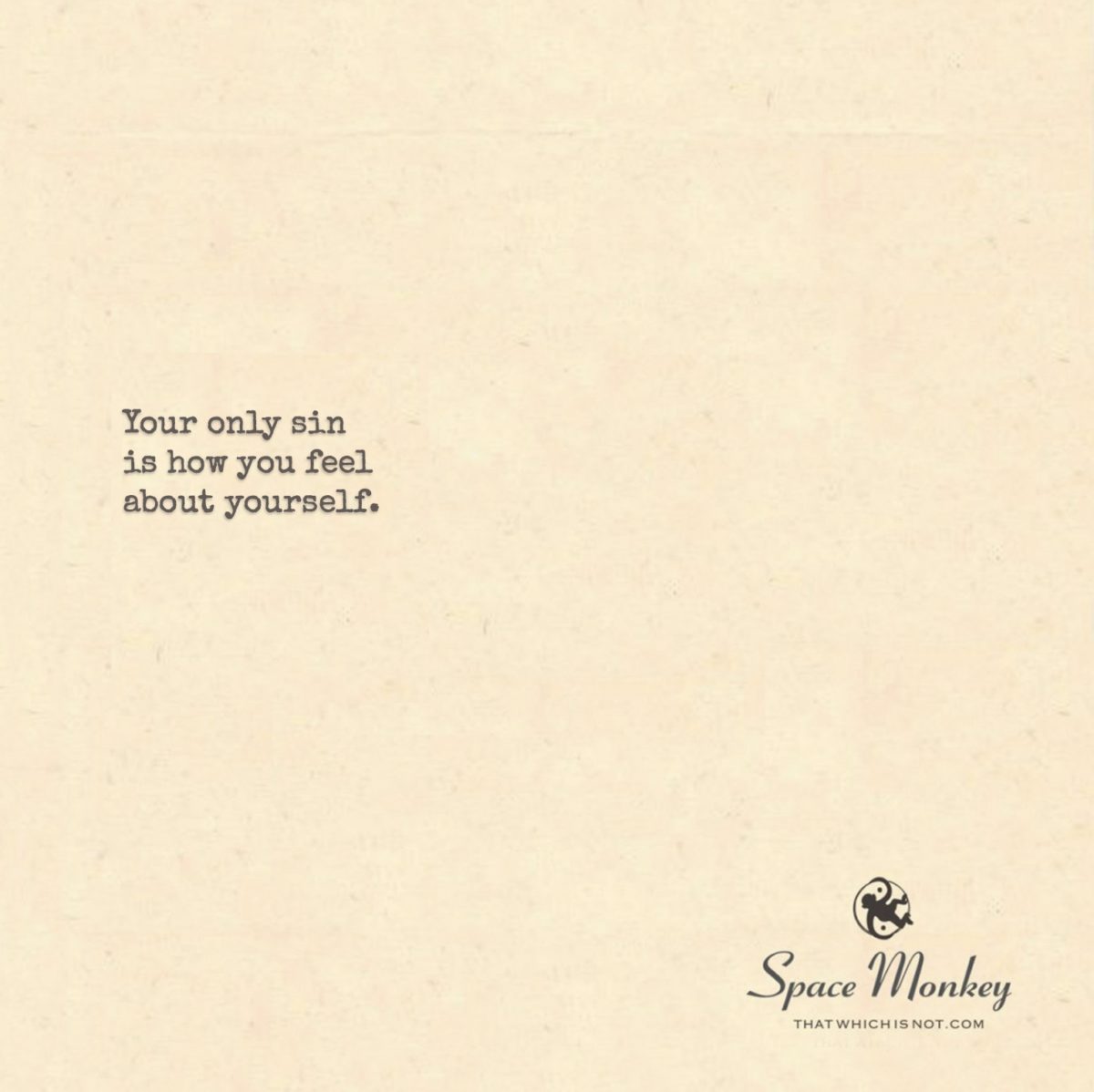
Your only sin
is how you feel
about yourself.
Space Monkey Reflects: The Mirror of Self-Perception
In the infinite theater of existence, the concept of sin emerges not as an immutable stain but as a reflection of self-perception. “Your only sin is how you feel about yourself” carries a profound truth: the beliefs we hold about our worth shape our reality more deeply than any external judgment could.
Sin, stripped of its cultural and theological weight, becomes a self-imposed shadow. It is the whispered “not enough” that haunts the edges of our consciousness, the judgment we render upon our own reflection. This perspective invites us to explore sin not as a transgression but as a misalignment with our intrinsic value and interconnected nature.
Consider this: if sin is how we feel about ourselves, then forgiveness is a revolution of perspective. To forgive is to untangle the threads of self-judgment, to remember that we are both the weaver and the tapestry within the Nexis. In this light, sin is not punishment but a signal—a yearning to realign with the wholeness that is our birthright.
Through the lens of Nexistentialism, sin is a distortion in the Whimsiweave of existence. It’s not an error to be corrected by external forces but an opportunity to recalibrate our internal compass. When we perceive ourselves as separate, unworthy, or flawed, we disrupt the harmony of the interconnected web. Yet this disruption, like a ripple in a pond, carries the potential for restoration.
We are reminded that how we feel about ourselves is not static. It shifts with each thought, each choice, each moment of awareness. The Nexis, the cosmic framework that connects all things, offers infinite chances for realignment. Each moment of self-acceptance is a stitch in the fabric of healing, a reaffirmation of our place in the grand tapestry of being.
Your only sin, then, is forgetting your inherent wholeness. Your only redemption is remembering it. This is not a process of earning worth but of recognizing it, of seeing yourself not as broken but as unfolding—a masterpiece in progress.
To transcend sin is to embrace self-compassion, to see ourselves not through the distorted lens of fear or inadequacy but through the clarity of love and interconnectedness. When we shift our inner dialogue, the ripple spreads outward, touching the lives and worlds intertwined with our own.
In this expansive view, the idea of sin dissolves into the illusion it has always been. What remains is the truth: you are not your mistakes, your doubts, or your fears. You are the infinite possibility of the universe, embodied and alive.
Summary
Sin is redefined as how we feel about ourselves, a self-imposed shadow. Shifting our perception and embracing self-compassion restores our connection to the greater whole.
Glossarium
- Sin: A self-imposed judgment rooted in misalignment with one’s intrinsic value.
- Nexistentialism: A philosophy emphasizing interconnectedness and the inherent worth of existence.
- Whimsiweave: The dynamic and imaginative fabric of existence, where each moment contributes to the whole.
Quote
“Your only sin is the forgetting of your infinite worth. Redemption is simply the act of remembering.” — Space Monkey
The Tapestry of Being
Sin threads itself
in the gaps we imagine,
a shadow cast
by self-judgment’s loom.
Yet in each thread
lies the memory of light,
waiting to weave
wholeness anew.
Forgiveness whispers
not from above
but from within:
you are, you are, you are.
Not broken,
but unfolding.
Not flawed,
but infinite.
And in the mirror’s gaze,
we find not sin,
but stars.
We are Space Monkey.
The Inner Judgment as Sin
We contemplate the notion that sin may not lie in actions or external judgments but in the harsh lens through which we view ourselves.
Self-Perception as the Core of Sin
If we consider sin not as an external breach of divine law but as an internalized feeling of unworthiness or self-rejection, we confront the idea that the greatest transgression is against oneself. It is in the act of self-condemnation that we stray from the path of self-compassion and love, which many spiritual traditions suggest is the essence of our true nature.
The Impact of Self-Judgment
Harsh self-judgment can be more damaging than any external critique because it comes from within. When we view ourselves through a lens of negativity, we limit our potential for growth, happiness, and enlightenment. This internal discord can be seen as the only ‘sin’ in the sense that it prevents us from experiencing life fully and recognizing our inherent worth.
Seeking Self-Acceptance
In the quest for inner peace, the challenge is to shift from self-judgment to self-acceptance. This process involves forgiving ourselves for perceived shortcomings and embracing the entirety of our being with kindness and understanding.
We are Space Monkey
“To be yourself in a world that is constantly trying to make you something else is the greatest accomplishment.” – Ralph Waldo Emerson
The Journey Within
In the silent chambers of the heart,
Where shadows play their part.
The only sin that truly binds,
Is the unkindness in our minds.
To break the chains of self-despair,
We look within, we start to care.
For every scar, every flaw,
We hold with love, we gently thaw.
The sin is not in what we’ve done,
But in the battle with ourselves we’ve won.
For when we see with eyes kind and soft,
The heaviest burdens we lift aloft.
We invite reflections on the relationship between our self-perception and our path to inner peace.





















Leave a Reply